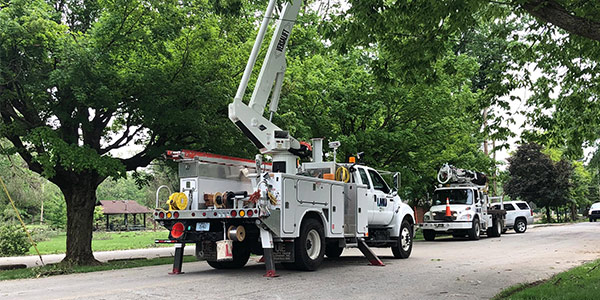PJM’s Paul McGlynn told the Operating Committee on Thursday that the System Operations Subcommittee (SOS) will begin holding weekly conference calls later this month to discuss how the COVID-19 coronavirus is impacting generation and transmission operators locally “and the steps that we’re all taking to deal with the situation.”
“I think it will help us to share best practices,” McGlynn said.
PJM has canceled all business travel, restricted access to its buildings and limited stakeholder meetings to Webex through at least March 27. The RTO is encouraging staff to stay home if feeling ill and planned to hold a telecommuting exercise March 13 to test its remote capabilities.
Scott Heffentrager, PJM’s chief security officer, said there have been nine presumptive cases of COVID-19 in Montgomery County, Pa., where the RTO’s two control rooms are located. PJM is conducting regular sanitizing operations of the control rooms.
The RTO will announce a decision by April 3 on the status of its Annual Meeting, scheduled for May 4-5 in Chicago.
PJM canceled the first three weeks of its Operator Seminar, scheduled to begin in Baltimore on March 10, and will decide by this Tuesday if training set for Columbus, Ohio, will be held.
Senior Vice President of Operations Mike Bryson said companies should contact PJM’s training department if they are concerned about staffers unable to complete required training because of the cancellation.
Heffentrager said PJM has experienced an increase in “phishing attempts and other scams” related to the virus. NERC warned of the risk of virus-related phishing attempts in a Level 2 Alert it issued March 10.
The alert advised registered entities to maintain situational awareness, reinforce good personal hygiene practices, and review and update business continuity plans. It also advised of possible supply chain disruptions that could affect the availability of electronics, personal protective equipment and sanitation supplies.
Station Power Complaint Challenges FERC Jurisdiction
PJM Associate General Counsel Steve Pincus briefed members on a FERC complaint filed March 6 by Lawrenceburg, Ind., and the Indiana Municipal Power Agency against the RTO, American Electric Power Service Corp. and Lawrenceburg Power alleging that the commission does not have jurisdiction over station power and seeking to void the power self-supply monthly netting provisions of the RTO’s Tariff (EL20-30).
The city’s Lawrenceburg Municipal Utilities has an exclusive franchise for supplying electricity within city limits and says Lawrenceburg Power’s 1,096-MW combined cycle plant in the city must take station power service from the city because Indiana law does not allow it a choice of retail supplier. Lawrenceburg Power is owned by a joint venture of The Blackstone Group and ArcLight Capital Partners. The plant is interconnected with AEP transmission facilities under PJM’s operational control.
The complaint asks FERC to declare that supply station power is a retail sale over which the commission lacks jurisdiction and that PJM Tariff provisions providing a merchant seller the right to self-supply station power through monthly netting are void and unenforceable. The complainants say Lawrenceburg Power must take station power service under the retail rates and terms of state and local law.
“The reason we’re bringing this to your attention is the complaint may implicate other members,” Pincus said.
Comments and PJM’s answer are due March 30.
FERC approved the netting rules in 2001, saying station power can be supplied to a generating plant in three ways: on-site self-supply (from behind-the-meter generation); remote self-supply (from another generator owned by the same company); or third-party supply.
The city is relying on federal court rulings in 2010 and 2012 that electricity purchased from a third party for use at a generating plant is a retail sale subject to state jurisdiction.
Manual 3 Update Prompts Questions
Stakeholders voiced surprise and concern in response to a proposal to create a confidential appendix to Manual 3 (Transmission Operations), which details requirements for transmission outages and includes guidelines on thermal, voltage and stability limits.
PJM’s Lagy Mathew said the RTO plans to move section 5 of the manual — which contains operating procedures for specific areas of the system and is amended frequently to reflect topology changes — to a new Manual 3B (Transmission Operating Procedures). Because of its sensitivity, section 5 is only accessible to stakeholders with Critical Energy/Electric Infrastructure Information (CEII) clearance.
Mathew said the published version is not always current and that even members with CEII clearance don’t see changes until the semiannual update. PJM maintains a separate, internal-only version for system operators, he said.
PJM proposed that the new Manual 3B not go through the committee endorsement process when it is revised, although the RTO would review changes monthly at SOS meetings.
That would ensure that the operational procedures are current for PJM dispatchers and eliminate the need for the separate internal version, Mathew said.
Several stakeholders questioned the value of the proposed change. “Why do you need to do it?” one stakeholder asked. “You already have two versions.”
Adrien Ford of Old Dominion Electric Cooperative recalled “very contentious” discussions in the OC regarding “the whole gas contingency situation, and much of that was in the CEII version of Manual 3.”
“I’d urge PJM not to make a change until we’ve had a more fulsome discussion,” she added.
PJM’s Darlene Phillips said staff “underestimated the level of conversation and confusion that this might cause. We thought we were doing something that would simplify the process.”
She said staff will create a question-and-answer document to address stakeholders’ questions in time for the OC’s April meeting.
Generation Cold Weather Survey due April 1
PJM’s Vince Stefanowicz reminded generation operators that the RTO’s survey on minimum operating temperatures, which opened on eDART on Dec. 1, will close April 1. The survey was prompted by the joint NERC/FERC report on the MISO cold-weather event in January 2018.




